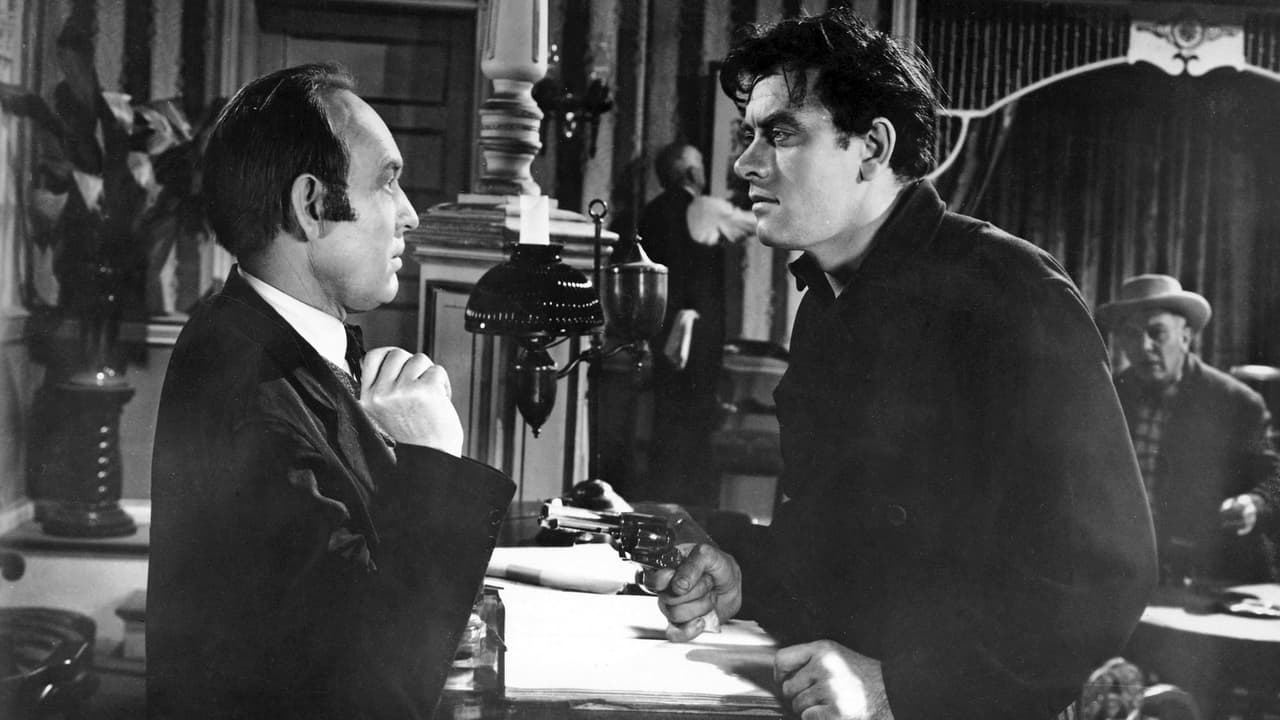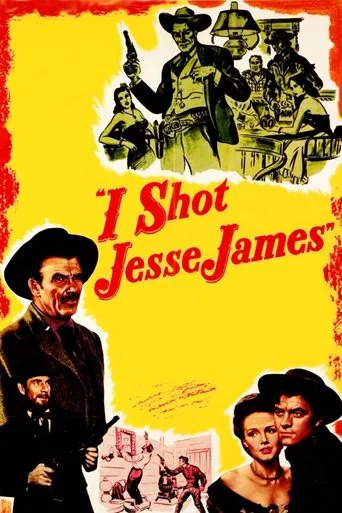

This rather mediocre film doesn't have a whole lot to recommend it other than the fact that it's an early example of Samuel Fuller's filmmaking before he developed his unique, kinetic, and instantly recognizable style."I Shot Jesse James" feels fairly anonymous, as if anyone could have directed it. It clearly was made for peanuts, and I wonder if that had a lot to do with Fuller's unusually constrained choices. Scenes are often shot with a static camera planted broadside to a pair or trio of actors who stand in one spot and deliver lines like they're on the world's tiniest stage. There is no dynamism to the film, and not a single shot stands out as being especially creative, which makes it feel very unlike a Samuel Fuller film.One thing that DOES, however, mark "I Shot Jesse James" as a Fuller movie is its preoccupation with the psychological effects of violence and masculine insecurity.John Ireland plays Bob Ford, the "I" of the film's title in the same year that he was nominated for a Best Supporting Actor Oscar for his performance in "All the King's Men." Grade: C
... View MoreI Shot Jesse James (1949)** 1/2 (out of 4) Fuller's directorial debut takes a look at the life of Bob Ford (John Ireland) after his cowardly killing of Jesse James. Ford is in love with a woman (Barbara Britton) but goes out West to try and make some money but what he doesn't know is that she's in love with another man (Preston Foster). The story of Jesse James in Hollywood has always been an interesting one because a lot of movies look at him as some sort of good guy when in truth he was pure scum who killed women and children. How this guy ever got to be looked at as a hero is beyond me but it's probably the same way Ford became a coward. People have debated on what Ford was but there's no question this Fuller film shows him as a weak coward and it even changes the ending of history to make him go out in a different way. This is technically a very well made film but at the same time there are quite a few problems with the screenplay. For starters, the movie seems to be hit and miss in regards to what it's trying to say. I didn't care too much for the way James was shown because they made him look and sound like one would expect Abraham Lincoln to come off. I'm not sure why they built Jesse up so highly just to change things around on Ford. The film seems to want to show Ford for a coward yet the screenplay goes off in different directions as to center on other aspects of his life and it's the later stuff that makes the film swing off track for me. With that said, the amount of talent on display here by Fuller can't be questioned. The visual style of the film is wonderful and he handles the action quite well. The psychological stuff comes off pretty well especially the scene right after the murder when Ford enters a bar only to have people looking at him differently than he expected. Ireland is very good in his role as is Foster. The two men work extremely well together and make the film worth seeing. There are many, many film dealing with this subject and while this one here isn't the best, there's still enough here making it worth checking out.
... View More"Whatya got to eat?" asks Bob Ford, who backshot his great friend Jesse James not too long ago. Says Joe, the bartender at the Silver King Saloon in Creede, Colorado, "Sweet corn, cornmeal mush, cornpone with cracklins and corn whiskey." "I'll have it," says Bob. Lukewarm corn, cooked ambitiously, is about all there is in Sam Fuller's debut as a director. Fuller had been writing scripts and story outlines in Hollywood for quite awhile. Finally he made a three-movie deal with a B movie producer: If I can direct the movies, and I won't charge you, I'll write the screenplays. The first of the three, I Shot Jesse James, is a potentially intriguing story of a loser, but told with a script that has little tension, directed with little flair and acted, for the most part, with a dull, steady cadence. A good deal of the dialogue and many of the actors are just competent. Still, if you're a Fuller fan, I Killed Jesse James may be worth watching. It's part of Criterion's Eclipse Series 5 - The First Films of Samuel Fuller. The set includes The Baron of Arizona and Steel Helmet. Fuller, in my view, was not one of the great directors (or screenwriters; he usually wrote his own screenplays). He wasn't one of the great craftsmen, either. What he had was a tough, knock-about personal story, a confident willingness to dance to his own music, a streak of subversiveness that could undermine the fatuousness of Hollywood, the establishment and the nervous, and enough talent to take the commonplace material and actors he often was dealt and turn at least parts of his movies into something to admire. He was the kind of Hollywood non-Hollywood director that some cineastes and film critics adore. It would take a person wearing blinders, however, not to recognize that his movies are, at best, variable. Most of them don't hold up very well unless the viewer has been first captured by Sam Fuller's iconic anti-establishment reputation. Pickup on South Street is probably his best work, with fine performances by an A-level cast, an unusual script considering it was originally intended as an anti-Commie screed, and a story that Fuller keeps moving along. The Big Red One, highly praised by many, is an effective and realistic war movie dear to Fuller's heart. But it seems (to me) to go indulgently on and on and on. For the rest of his movies, those that I've seen, there's just excellent bits and pieces mixed into a B-movie sensibility, awkward dialogue (almost any scenes involving a man and woman), and too much discursiveness. Fuller, in my opinion, needed a strong editor to work with and a strong writer with whom to collaborate. I have a feeling that Fuller would find either prospect completely unsatisfactory. Shock Corridor and The Naked Kiss, anointed by Criterion, for me aren't just pulp movies, they're almost embarrassing examples of overwrought pulp movies. This is all just opinion. Watch The Naked Kiss and see what you think.But back to I Shot Jesse James. When Bob Ford (John Ireland) puts a bullet in the back of his friend, Jesse James, Ford hopes to gain amnesty and a large reward. He'd been befriended by James and had been part of James' gang. Ford wants to marry the love of his life, the singer Cynthy Waters (Barbara Britton). He thinks he can leave the criminal life and settle down with Cynthy. Instead she rejects him. He's called a coward and a backshooter. Most people hold him in contempt. He gets only a small part of the reward. He still thinks that if only he can make money he can win Cynthy. And there's that straight talking' guy who likes Cynthy, too, a man named John Kelley (Preston Foster, top billed) who keeps showing up. There's a showdown, and that's that. John Ireland, in my view, had a lot of screen presence, but he needed a good script and strong direction to be at his best. Just watch him as Fantail in Raw Deal (1948), as Cherry Valance in Red River (1948) and as Jack Burden in All the King's Men (1949). Even in a piece of Brit noir schlock, The Glass Tomb (1955), he brings enough quality and interest to make it worth watching. Here, he's constrained by an uninspired script that gives him no opportunity to do anything but show what a sad sack loser Bob Ford is. But wait until that showdown. It only lasts a couple of minutes, but John Ireland shows what he can do.
... View MoreThe Jesse James gang was a group of Missouri farmers turned outlaws. Heading the gang was Jesse (Reed Hadley)and his brother Frank (Tom Tyler). Other members included Charlie Ford (Tommy Noonan)and his younger brother, Bob (John Ireland.)While the law hunts him, Jesse lives quietly in a rented house on the corner of Lafayette and Twenty-first street in St. Joseph, Missouri, under the alias of Tom Howard. His wife Zee (Barbara Woodell) begs him to end his association with the Ford brothers. Before they can leave on a "last" bank holdup, Bob learns that is childhood sweetheart, Cynthy Waters (Barbara Britton), now an actress, is in St. Joe and he brushes aside all caution to see her.Cynthy is beginning to realize that she is a liability to her manager, Harry Kane (J. Edward Bromberg), because she will not leave Missouri. Meanwhile, John Kelley (Preston Foster), has come into her life. She pleads with Bob to turn honest.Cynthy tries to get a pardon for Bob, but the best offer she can get is for a 20-year stretch in prison. Then, the Governor offers amnesty and a $10,000 reward to any member of the James gang betraying Jesse. When his chance comes (April 3, 1882)Bob shoots Jesse in the back. He gets the amnesty but the reward is cut to $500. He also loses the love and respect of Cynthy, but he blames John Kelley. Bob, needing money, joins Kane's show in an act showing how he killed Jesse James, but the act is a miserable flop.Bob goes to crowded Creede, Colorado, scene of a silver boom.There, he has to share a room with another prospector, who turns out to be Kelley. The next morning, Kelley and a diamond ring that Bob had bought for Cynthy are both gone. While hunting for Kelley, Bob meets an aged prospector, Soapy (Victor Kilian), who takes him in as a partner. They strike it rich and Bob sends for Cynthy, who arrives accompanied by her maid (Jeni LeGon) and Kane, and Bob meets the arriving party.Kelley also shows up, dragging a hotel clerk who admits to stealing the ring. Kelley is surprised to find Cynthy with Bob and thinks they are married. He is relieved to learn the truth and soon accepts the job of Creede's town Marshal. Cynthy admits to Kelley that she does not love Bob, but she feels responsible for his having killed Jesse.Frank James comes to her hotel suite demanding that Cynthy tell him where Bob is. Kelley disarms him and locks him in jail. Days later, Bob and Soapy and others are celebrating in the hotel bar, awaiting news of the verdict on Frank James. The news of his acquittal and Frank himself arrive simultaneously, and Frank, who holds the upper hand informs Bob of Kelley's and Cynthy's relationship, knowing its effect on Bob would be worse than death.Bob leaves to have a shoot-out showdown with Kelley. This film was the third time Tom Tyler had played Frank James. Reed Hadley played Jesse James in this film and had the role Frank James in 1950's "The Return of Jesse James," making him and Wendell Corey the only two actors who had portrayed both brothers on the screen.
... View More